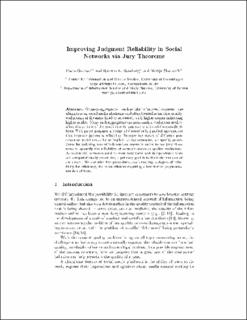Improving Judgment Reliability in Social Networks via Jury Theorems
Journal article, Peer reviewed
Accepted version
Permanent lenke
https://hdl.handle.net/11250/2720807Utgivelsesdato
2019Metadata
Vis full innførselSamlinger
Originalversjon
10.1007/978-3-662-60292-8_17Sammendrag
Opinion aggregators—such as ‘like’ or ‘retweet’ counters—are ubiquitous on social media platforms and often treated as implicit quality evaluations of the entry liked or retweeted, with higher counts indicating higher quality. Many such aggregators are poor quality evaluators as they allow disruptions of the conditions for positive wisdom-of-the-crowds effects. This paper proposes a design of theoretically justified aggregators that improve judgment reliability. Interpreting states of diffusion processes on social networks as implicit voting scenarios, we specify procedures for isolating sets of independent voters in order to use jury theorems to quantify the reliability of network states as quality evaluators. As real-world networks tend to grow very large and independence tests are computationally expensive, a primary goal is to limit the number of such tests. We consider five procedures, each trading a degree of reliability for efficiency, the most efficient requiring a low-degree polynomial number of tests.
